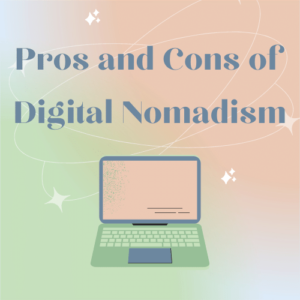
10 brutally honest pros and cons of being a digital nomad 🌎
I consider myself to be a “digital nomad.” I work and live in different countries, travel the world, and manage my workload entirely from my laptop. While digital nomadism is fantastic and has always been my dream (how amazing to live your dream!), there are distinct pros and cons of being a digital nomad that many people may not realize.
In this article, I will discuss the pros and cons of a nomadic lifestyle, the challenges of being a digital nomad, and unique things I didn’t realize about life as a digital nomad. So, let’s answer: what are the advantages and disadvantages of being a digital nomad?
Pros and cons of being a digital nomad: Benefits
1. You can work anywhere, anytime
Working from anywhere is one of the most distinct pros and cons of being a digital nomad. It’s a pro because location independence is amazing. Not being stuck to a specific time frame or schedule is phenomenal, and I’m not sure I could go back to the traditional 9-5 after this kind of flexibility and freedom.
Knowing you can pack up and go where you need to go to do what you need to do while still maintaining a job and an income source is phenomenal, honestly.
2. You can work how you want to
Are you a very rigid worker or easily distracted? Focused or chaotic? Night owl or morning… owl? If your ~method~ requires 20 minutes of TikTok per 15 minutes of productivity, then digital nomadism might be for you. Working in an office (or worse, an open-concept office 🤮) was not for me. I like being able to sit ergonomically at a desk, or even lay unergonomically on the floor, or set my laptop up at a local café for a few hours. I can wear slacks or pajamas (usually pajamas). Nobody knows or cares.
3. There are more online communities now than there ever have been for digital nomads
One of the best parts of being a nomad and living in places where you don’t speak the language fluently is connecting with other similar people online. Slack, Discord, Twitter, Facebook, Reddit.
This is both one of the pros and cons of being a digital nomad because, frankly, some of the communities are not so friendly. But also establishing community over a location-independent mindset does not necessarily mean you will connect with everybody. The kind of person drawn to Thailand will not be the kind of person attracted to Mexico, and even two people in the same place will have an entirely different approach to work, life, relationships, etc.
Plus, many people in the digital nomad lifestyle can be obnoxiously self-promotional. I’m no angel. I have a blog and would love it if people read my blog. However, the tech crypto bro and the Instagram van life influencer who aggressively try to market themselves and their digital nomad lifestyle course (for only $599!) can make people understandably wary of building relationships within the digital nomad community.

I think the smarmy influencer vibes will lessen in the coming years as more people are becoming work-from-home professionals and digital nomads. There was a time when all digital nomads were seen as very counterculture and alternative, but that’s becoming less common. I hope we can build more normal relationships and have a more modest discourse around the lifestyle.
4. You’ll learn A LOT
I can honestly say that living out of my home country and working remotely from different continents has taught me more in one year than I feel I learned in 30 years prior. There’s something humbling and magically disorienting about living and working in a culture very opposite from yours. I’ve always been a highly independent person, but moving out of the country has made me recognize that a lot of my independence was predicated on knowing how to navigate my own culture, which is not helpful in most of the world.
5. You won’t feel like you’re “living to work”
This, I think for me, was more important than leaving my country or even exploring the world. I didn’t realize how much of my time was spent getting ready for work, commuting to work, being at work, commuting home from work, decompressing from work, dreading work, and otherwise feeling like my entire life was passing me by just to pay the bills.

Don’t get me wrong, I still pay the bills. I still work. But the freedom that comes with not being beholden to a physical location is incomprehensible. That’s not to say it’s entirely perfect. There is a level of security that comes with a traditional job that you don’t have when your boss is 5,000 miles away. However, it’s very humanizing to be in control of your schedule and location.
Pros and cons of being a digital nomad: Disadvantages
I don’t want to complain about being a digital nomad because I love it, but nothing is perfect. I want to demystify some of the lifestyle for people considering becoming a digital nomad because it’s not as easy and carefree as it’s cracked up to be. There are reasons why many people don’t leave their country or their city even if they can, and we’re going to discuss some of those reasons. So, what are the cons of being a digital nomad?
1. Harder to maintain a work/life balance
As a digital nomad, you can work anytime and anywhere, but I consider it both a pro and a con because it’s much harder to navigate to a work-life balance when you can work at any time. I think this was particularly bad when freelancing because I felt a lot of pressure to take on as much work as possible. After all, it’s not a stable income.
I thought that life would become a lot slower when I left my traditional work environment. However, I noticed that I worked more than ever once I started working “for myself.” This is fine if you aren’t a particularly driven or anxious person, but if you have any financial insecurity or tendencies to perfectionism, it can drive you mad. I honestly couldn’t believe how much money I was making, but that also had drawbacks because life shouldn’t be all about making money. Work stress in a different country is still stressful.
2. Logistical issues are one of the most common disadvantages of being a nomad
Let’s be honest: many things are easier when you’re close to your home country. Bureaucracy is easier, communication is more manageable, and getting things done in your native language is easier. I used to think the United States had a pretty frustrating bureaucratic system until I moved to other places and realized how good I had it. I’d rather spend the afternoon at the DMV than spend four months trying to get any paperwork done in other countries. Plus, things take significantly longer (and cost more) when adding an international element.
One of the pros of digital nomadism is the freedom of movement, but you don’t realize how much the day-to-day logistics of life will restrict that freedom of movement, even when your work doesn’t. Sure, it sounds luxurious to lounge by the beach while you’re working. But what about the sand in your laptop? What about the safety aspect of your stuff getting stolen? What about the glare on the screen from the sun? What about the ergonomics of being productive on a beach chair? How does the cellphone reception on the beach impact your productivity? (Hint: a lot.)

I’m not defending a traditional, 9 to 5 office space environment. Not at all. But… I get it. It does make sense why people should think that the structure and features of a standard office are better for productivity when you’re trying to get a crumb of Internet reception at a loud and busy café.
3. Lack of comfort
When I first started traveling, I shared an Airbnb with this remarkable woman who was working as a digital nomad and traveling throughout the United States. I’ll never forget it because I distinctly remember chatting with her and being envious of her lifestyle, but then she showed me her setup. This woman was sitting on the floor, on a small pillow, with her laptop and a tiny portable screen, working as a very busy project manager. She was on Zoom calls most of her day, and I could not fathom how uncomfortable her setup was!
During our conversation, she talked about how she felt like she was living her dream (relatable) but that she wasn’t sure how sustainable of a lifestyle it was. She missed stability, having a dedicated setup, and maintaining relationships and friendships.
I don’t want to complain, but working remotely can sometimes be very uncomfortable. Not having a desk, a comfortable chair, a reasonably sized monitor, or any ergonomics can get old after a while.
See our post on the best tips for ergonomics while traveling.
4. Making friends is hard
I’ll admit to my naivety in this situation, but I honestly did not realize how difficult it would be to build and maintain relationships in a country where you don’t speak the language. Call it American hubris, but I genuinely did not think about the reality of making friendships in countries where English isn’t even the second, third, or fourth most frequently spoken language. I thought they would always be English speakers or even expat communities to befriend, and I was wrong.
I also overestimated my ability to pick up a language. I assumed that being immersed in the culture would help me pick up on Moroccan Darija, and that has not been the case. It’s a challenging, very beautiful language. While I have picked up some phrases and plenty of vocabulary words, it is certainly not enough to build meaningful friendships with locals. I have a ton of respect for anybody who can learn a second language fluently because it’s really freaking difficult. And this problem is compounded if you’re not staying in one place for any length of time as a digital nomad.

I specifically wanted to travel to experience other cultures, languages, and ways of life. But unfortunately, the language has made this both a pro and con of being a digital nomad.
5. Reliable internet is still not the default in many places
While many things in the United States are costly, you can typically trust that they will work, at least most of the time. When I pay for service in the States, I typically get that service relatively quickly. This is not true in many other places in the world. Often, there are only one or two options for service providers, and if they don’t want to do their job, there isn’t much you can do about that.
Frustrating Internet connection goes from annoying to devastating when you work online. If you have a Zoom meeting, an interview, a test, a deadline, or anything heavily dependent on reliable Internet in your workflow, then and only then do you realize exactly how digital nomad life might break down working remotely.
In the United States, many businesses and cafés will have quite a decent Internet available for their patrons. This is also not sure in many places around the world. However, this is rapidly improving globally, so having a plan (and a backup plan) for your internet needs if you intend to work remotely is super important.
FAQ about the pros and cons of being a digital nomad
Is being a digital nomad worth it?
I think it’s absolutely worth it if you have the right mentality and work style.
Is being a digital nomad lonely?
Living in a country where you don’t speak the language can be very lonely. It’s harder to make friends than you might realize. That’s why online communities are great for connecting with other digital nomads.
Do I need a specific skill set to become a digital nomad?
I completely changed careers when I started working remotely, but there are creative ways to use your current skill set. Do some research around what types of skills people are paying for when hiring remotely and see how your personality and skillset can meet those needs. Learn the skills necessary to fill in the gaps, and get creative about proving your worth.
Are digital nomads happy?
I think happiness is a choice, whether you’re a digital nomad or not. If you aren’t happy wherever you are, I don’t think you’ll be satisfied as a digital nomad. Happiness comes from within, and if you have a terrible outlook, a change in scenery won’t fix that.
Pros and cons of being a digital nomad – Conclusion
While being a digital nomad has numerous benefits, it’s essential not to ignore the challenges. Idealizing the lifestyle means you’ll end up disappointed or ill-prepared. However, despite the challenges, I love the nomadic lifestyle, but it’s not for everybody.
What are your thoughts on the pros and cons of being a digital nomad? Do you have any other questions on the pros and cons of being a digital nomad? We’d love to hear your thoughts! 💭





